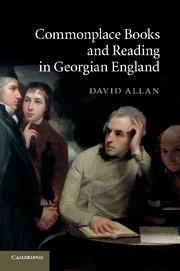Book contents
- Frontmatter
- Contents
- List of abbreviations
- Acknowledgements
- PROLEGOMENON
- PART I ORIGINS
- PART II FORM AND MATTER
- 5 ‘A sort of register or orderly collection of things’: Locke and the organisation of wisdom
- 6 The importance of being epigrammatic
- 7 Manufacturing an encyclopaedia
- PART III READERS AND READING
- PART IV ANCIENT AND MODERN
- PART V TEXTS AND TASTES
- PART VI ANATOMISING THE SELF
- ENVOI
- Bibliography
- Index
7 - Manufacturing an encyclopaedia
Published online by Cambridge University Press: 03 May 2011
- Frontmatter
- Contents
- List of abbreviations
- Acknowledgements
- PROLEGOMENON
- PART I ORIGINS
- PART II FORM AND MATTER
- 5 ‘A sort of register or orderly collection of things’: Locke and the organisation of wisdom
- 6 The importance of being epigrammatic
- 7 Manufacturing an encyclopaedia
- PART III READERS AND READING
- PART IV ANCIENT AND MODERN
- PART V TEXTS AND TASTES
- PART VI ANATOMISING THE SELF
- ENVOI
- Bibliography
- Index
Summary
My quarrel with him is, that his works contain nothing worth quoting; and a book that furnishes no quotations is, me judice, no book – it is a plaything.
Thomas Love Peacock, Crotchet Castle (London, 1831)Despite their evident passion for epitaphs, anecdotes, acrostics and riddles, commonplacers did not, it seems, confine their attentions exclusively to these most succinct and strikingly stylised of compositions. Much that they sought to preserve was in fact significantly more prosaic and also far more expansive in character. This is hardly surprising. After all, wisdom and information do not always arise in conveniently laconic form. Most authors, moreover, are not primarily concerned to demonstrate their mastery of the magical properties of language. On the contrary, their first priority, although aesthetic issues are rarely entirely irrelevant, is to communicate as effectively and accurately as possible a series of facts, descriptions, opinions or arguments. In terms of the practical impact of this more functional authorial agenda upon the activities of the Georgian commonplacer, it was only natural that the latter would often be found transcribing prose extracts rather than verse, the resulting manuscript in turn coming to resemble an encyclopaedia or a digest of knowledge more than an anthology or collection of poetry. Of course, many of these more substantial extracts might still savour unmistakably – like most epigrams – of the pious and the moralising.
- Type
- Chapter
- Information
- Commonplace Books and Reading in Georgian England , pp. 83 - 98Publisher: Cambridge University PressPrint publication year: 2010



